|
|
|
Sort Order |
|
|
|
Items / Page
|
|
|
|
|
|
|
| Srl | Item |
| 1 |
ID:
143774


|
|
|
|
|
| Summary/Abstract |
This study analyses the changing investment climates for China’s sovereign wealth fund, the China Investment Corporation (CIC), in the US, the UK and France. It assesses legislative flexibilities, public opinions and macroeconomic conditions in the three polities in order to ascertain whether the investment review process of each is susceptible to politicization, and if such susceptibility has changed in line with macroeconomic variations. The study finds that the US investment review process is susceptible to politicization and that such politicization has likely taken place following the recovery from the global financial crisis, resulting in a worsened investment climate for Chinese investors, including CIC. The investment review processes in the UK and France have not been susceptible to politicization. Moreover, negative macroeconomic conditions for each of the two countries following the eruption of the Eurozone crisis have resulted in an improved investment climate for CIC, although brought about by the proactive stance of governments and companies rather than by any de-politicization.
|
|
|
|
|
|
|
|
|
|
|
|
|
|
|
|
| 2 |
ID:
143772
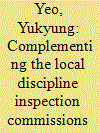

|
|
|
|
|
| Summary/Abstract |
Rampant corruption among China’s party members suggests that the existing system of party discipline is too fragile to function effectively. The question now is how the central leadership reinforces party supervision over leading cadres in both government and state firms. The Chinese leadership, after some period of experimentation, has introduced new institutions, named zhongyang xunshizu (central inspection groups), to complement the existing discipline system. This article examines how these central inspection groups complement the existing groups institutionally and normatively, and explores the Chinese Communist Party’s institutional engineering efforts to maintain legitimacy, organizational integrity and sustainability. This article considers these initiatives from the view of institutional complementarity and compensation. Theoretically, the application of institutional complementarity to China’s party discipline inspection should expand the scope of analysis into China’s institutional reform of party discipline. Empirically, the central inspection groups are the least known, but perhaps most significant, direct channel for central supervision of leaders in both local government and key state-owned enterprises. By comparing the rationale and operation of disciplinary inspection commissions (DICs), this article attempts to explain how the central inspection groups complement the supervision of local DICs in terms of scope, structure and methods of control.
|
|
|
|
|
|
|
|
|
|
|
|
|
|
|
|
| 3 |
ID:
143776
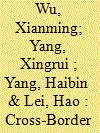

|
|
|
|
|
| Summary/Abstract |
Mixed results from studies on Chinese cross-border mergers and acquisitions (M&As) have been a puzzle for both academia and business professionals over the years. Do these M&As create value when Chinese firms acquire foreign target firms suffering heavy losses and even on the verge of bankruptcy? This article explores the wealth effect of M&As conducted by Chinese firms as well as the relevant factors from the asset-seeking perspective. The authors use 180 M&A cases conducted by listed firms in China between 2002 and 2012 as samples and examine their wealth effects in a method of event study. The results show that these M&A activities have produced significant positive wealth effects during the event window of [–10, 10]. The authors then study the key factors affecting wealth effects. The findings reveal that an acquiring firm’s strength via research and development (R&D) and M&A experience generates significant positive impacts on the wealth effect. The findings also reveal that an innovation orientation and development stage of host countries helps create positive wealth effects; vertical M&As are particularly favored by the market since they can gain easier access to R&D, marketing channels or mineral resources.
|
|
|
|
|
|
|
|
|
|
|
|
|
|
|
|
| 4 |
ID:
143773
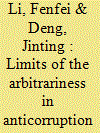

|
|
|
|
|
| Summary/Abstract |
Based on interviews in local commissions of China’s Party discipline inspection (CDIs), this article investigates the effectiveness, internal limits and selectiveness of CDIs in the anticorruption campaign. It uses a micro-level analysis to explore the role of law in affecting the CDIs’ anticorruption work and concludes that local CDIs remain heavily affected by the same-level local governments, but are effective in combating local corruption due to recent reforms that have strengthened higher-level CDIs’ control over lower-level CDIs. The current internal decision-making systems of the CDIs make their anticorruption work heavily dependent upon the central leadership. Their work is still not institutionalized and relies heavily on higher-level intervention. Nevertheless, law played a crucial role by providing the bottom lines to set the decision-making standards at different stages. Legal reforms should aim to further clarify and lift these baseline standards.
|
|
|
|
|
|
|
|
|
|
|
|
|
|
|
|
| 5 |
ID:
143768
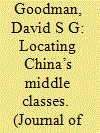

|
|
|
|
|
| Summary/Abstract |
The middle class has emerged as a political phenomenon in China since 2002 through a state-sponsored discourse that sees it as a universal and universalising class. Although the evidence from other countries suggests that the growth of middle classes leads to regime change, this seems to be an unlikely outcome for China. In the first place, China’s middle class discourse has uncertain sociological foundations. Secondly, where the middle classes are identifiable they still probably constitute no more than 12% of the population. Thirdly, China’s middle classes have a very close relationship to the Party-state. Most of the professional and managerial middle classes are part of, or closely associated with, the Party-state; and the entrepreneurial middle class has either emerged from within the Party-state or has been incorporated into it.
|
|
|
|
|
|
|
|
|
|
|
|
|
|
|
|
| 6 |
ID:
143770
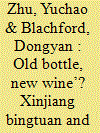

|
|
|
|
|
| Summary/Abstract |
Xinjiang Production and Construction Corps (Xinjiang Shengchan Jianshe Bingtuan—shortened form Bingtuan) is a distinctive military agricultural settlement and production institution in China’s western region, Xinjiang. It is also a modern form of China’s traditional ethnic frontier governing mechanism. This article discusses Bingtuan’s historical precedents, modern development and innovative change for Xinjiang governance. In an examination of Bingtuan’s main functions for China’s ethnic frontier governance, this article argues that in addition to economic sustainability and territorial security, Bingtuan played an important but multifaceted role in ethnic relations in Xinjiang, such as territorial fragmentation, ethnic separation and redefinition of regional identity; therefore Bingtuan not only makes its administrated area China’s ‘frontier of settlement’ but also acts as a key state agency for whatever future Xinjiang might have.
|
|
|
|
|
|
|
|
|
|
|
|
|
|
|
|
| 7 |
ID:
143777
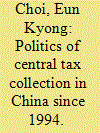

|
|
|
|
|
| Summary/Abstract |
The central leaders in China adopted a tax assignment system and centralized taxation in 1994 with the goal of increasing central tax revenues. By setting up the National Tax Bureau, the central leaders intended to leave central tax collection undisturbed by local influences. However, informal practices at the local level revealed that the local governments colluded with the central tax bureaucrats stationed in their regions at the expense of central interests. The need to develop local economies, an important task assigned to local governments, is one important reason behind local interference in central tax collection. This study finds that the central government coped with this problem by changing the incentives of the provincial party secretaries through linking central tax collection in a jurisdiction with their chance of promotion.
|
|
|
|
|
|
|
|
|
|
|
|
|
|
|
|
| 8 |
ID:
143771


|
|
|
|
|
| Summary/Abstract |
The revolving door of private entrepreneurs in China is considered to be a crucial strategy of the Chinese Communist Party to adapt to the market transition and contributes much to the compliance of private entrepreneurs. However, based on the data from the official National Survey on Private Enterprises in 2006, this article finds that the Xiahai entrepreneurs revolving out of the Party-state were significantly and robustly more confrontational than those without state employment backgrounds. We argue that the unique path of the market transition in China makes the former political and economic elites more confrontational and has a significant effect on who might turn into potential challengers of the current regime among the economically powerful social class.
|
|
|
|
|
|
|
|
|
|
|
|
|
|
|
|
| 9 |
ID:
143769


|
|
|
|
|
| Summary/Abstract |
Besides being the most influential television news program with the largest viewership in China, Xinwen Lianbo (Television News Simulcast) also boasts of unique political value in the Chinese media landscape. Each and every change in form the program has adopted since its first broadcast in 1978, has been a reflection of a certain aspect or element of the arch of political reform in the country, and has been widely interpreted as such, thus making it ‘the toughest nut to crack’ in news reform. Throughout its 35 years of history, by striving to represent, maintain, adapt and disseminate the established ideological framework, thus ensuring political reform has progressed at a cautious and gradual pace acceptable to the ruling party, Xinwen Lianbo has proven to be a great example of the construction of political reality by journalistic text on the symbolic level. This article adopts the methodology of new social history with semi-participatory observation as it combs through the evolution of Xinwen Lianbo over 35 years, in an attempt to explore the patterns and paths of Chinese journalistic reform and the factors that have come to shape this journey in the broader context of political reform in China.
|
|
|
|
|
|
|
|
|
|
|
|
|
|
|
|
| 10 |
ID:
143775


|
|
|
|
|
| Summary/Abstract |
This article explores the domestic and international factors that influence the strength of investment protection and liberalization provisions embedded in China’s bilateral investment treaties (BITs). It hypothesizes that China is more likely to sign stringent BITs following the leadership’s implementation of major reform initiatives; when the partner country possesses strong democratic institutions that not only allow domestic interest groups with strong interests in legalization to press for their policy preferences, but also reduce the leaders’ aversion to signing highly legalistic international agreements that bind their behavior; when divergent diplomatic interests render informal negotiations a less viable means of dispute resolution. Statistical analyses of the stringency of the key provisions included in 71 Chinese BITs signed between 1982 and 2011 lend substantial support to the above hypotheses.
|
|
|
|
|
|
|
|
|
|
|
|
|
|
|
|
|
|
|
|
|